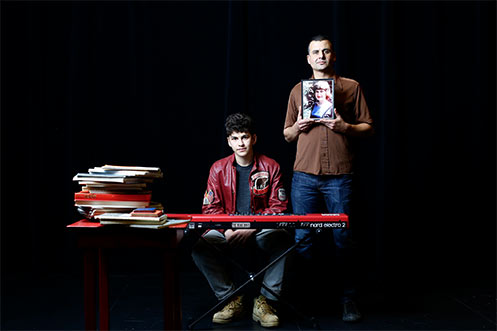
 |

— Zak (left) and Marcus Youssef with photo of Roleene Youssef (right). Photo by Simon Hayter. HOW HAS MY LOVE AFFECTED YOU? The modern theatre is rich in plays that use the stage as a psychiatrist’s couch on which the playwright—invariably male—works out his issues with his parents. Eugene O’Neill, Arthur Miller, Edward Albee and Michel Tremblay are just a few of the writers whose major works present family autobiographies in thinly disguised dramatic form. Vancouver playwright and actor Marcus Youssef has taken theatrical psychobiography to another level. Focusing on his vexed relationship with his wealthy banker father in the recent PuSh Festival two-hander, Winners and Losers, and with his mother Roleene in his new play, the Arts Club premiere How Has My Love Affected You?, Youssef doesn’t bother to disguise what Freud called his “family romance” as fiction. How Has My Love Affected You? is documentary theatre, a memoir not so much performed as narrated by Youssef himself, with the assistance of his teenage son, Zak. Names have not been changed and documents—mostly Roleene’s extensive, compulsive journal entries—are produced verbatim. A partial biography of this fascinating woman, the play primarily concerns how her love, or the absence of it, has affected Marcus as a child and an adult. Director Rachel Ditor cleverly calls it a coming-of-middle-age story. On a stage cluttered with boxes and papers, Marcus begins by telling us about his mother’s current situation in a nursing home. He then flashes back to her first hopeful journal entry in 1959 and moves through her life and his, returning at the end to the nursing home where she lies in an advanced stage of Alzheimer’s, unable to recognize him. Roleene was a rebel, coming of age in the 1960s at Berkeley, where she met and married Marcus’ upwardly mobile father and became an uncomfortable corporate wife in the Mad Men culture of the times. The rocky marriage ended in the 1980s. At that point 16-year-old Marcus became “my mom’s best friend” in an intense, complex, emotionally confusing relationship. Roleene goes back to school and becomes a family therapist, entangling Marcus in her psycho-social interpretations of everything. In the 1990s, enamoured of Recovered Memory Syndrome, she tries to convince him that his father sexually abused him as a child. Meanwhile, Marcus desperately attempts to escape his mother’s clutches without abandoning her as his father had. He needs to grow up, be his own person, have his own family. But the love-hate relationship with his mother leaves him, he tells us, with a black hole where his heart should be. She becomes more difficult and (in his eyes) irrational as she grows older, and their relationship becomes increasingly painful as he becomes her primary caregiver. At one point he shows us the final version of her will, in which she explicitly leaves him nothing. Finding ways to theatricalize this kind of dramatic storytelling without losing its sense of personal and documentary authenticity involves a tricky balance. Jamie Nesbitt’s projections add an effective visual element, and director Ditor has Zak sometimes read something written by Roleene or take on the role of Marcus in a roughly staged scene. Mostly Zak plays keyboard and sings songs composed by Veda Hille that comment on a passage in Roleene’s journals or an event in the mother-son relationship. Hille’s lyrics are consistently smart and Zak’s playing does justice to her lovely music. But his acting and singing are strained, and I never fully understood his role in the drama, although Marcus takes pains to explain it near the end. Brave, candid, and (as Marcus admits) narcissistic, How Has My Love Affected You? will resonate in different ways with everyone who has ever had a parent or been a child. |
